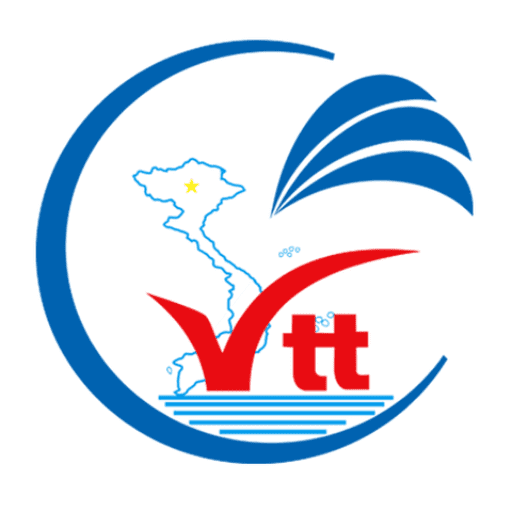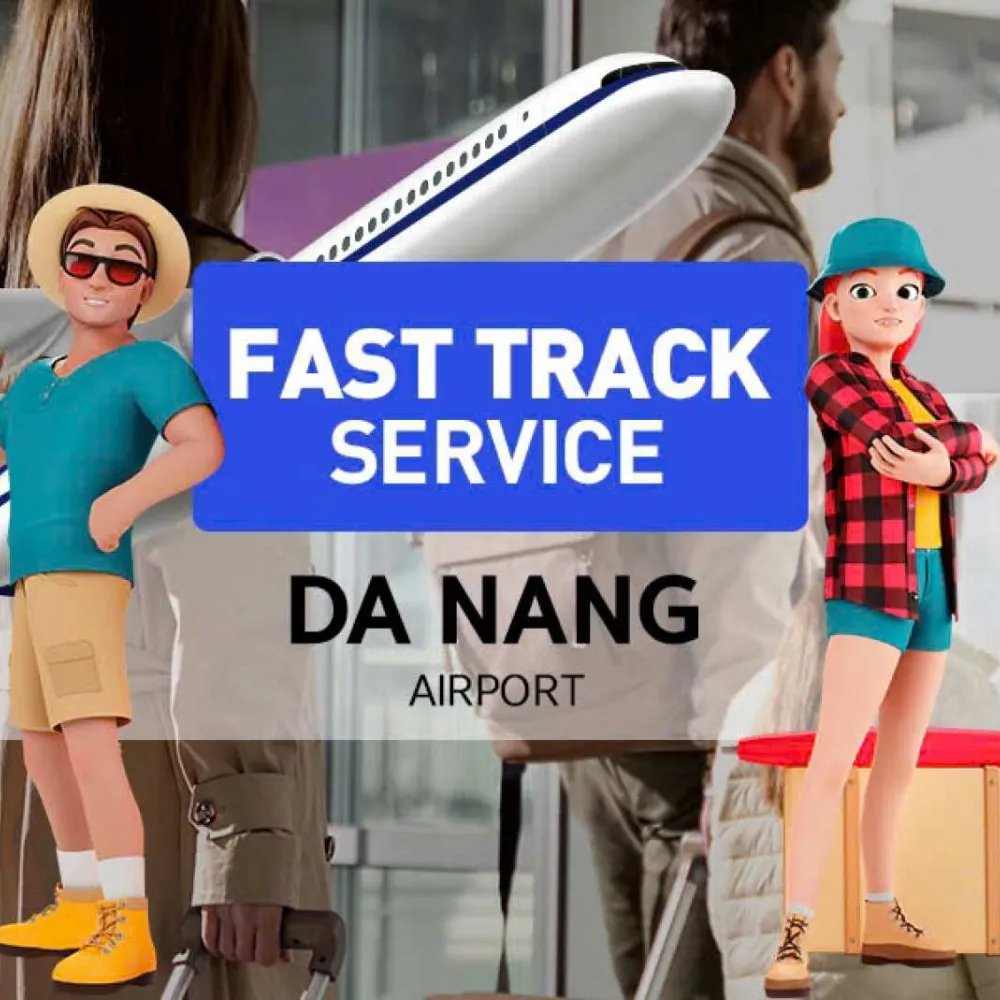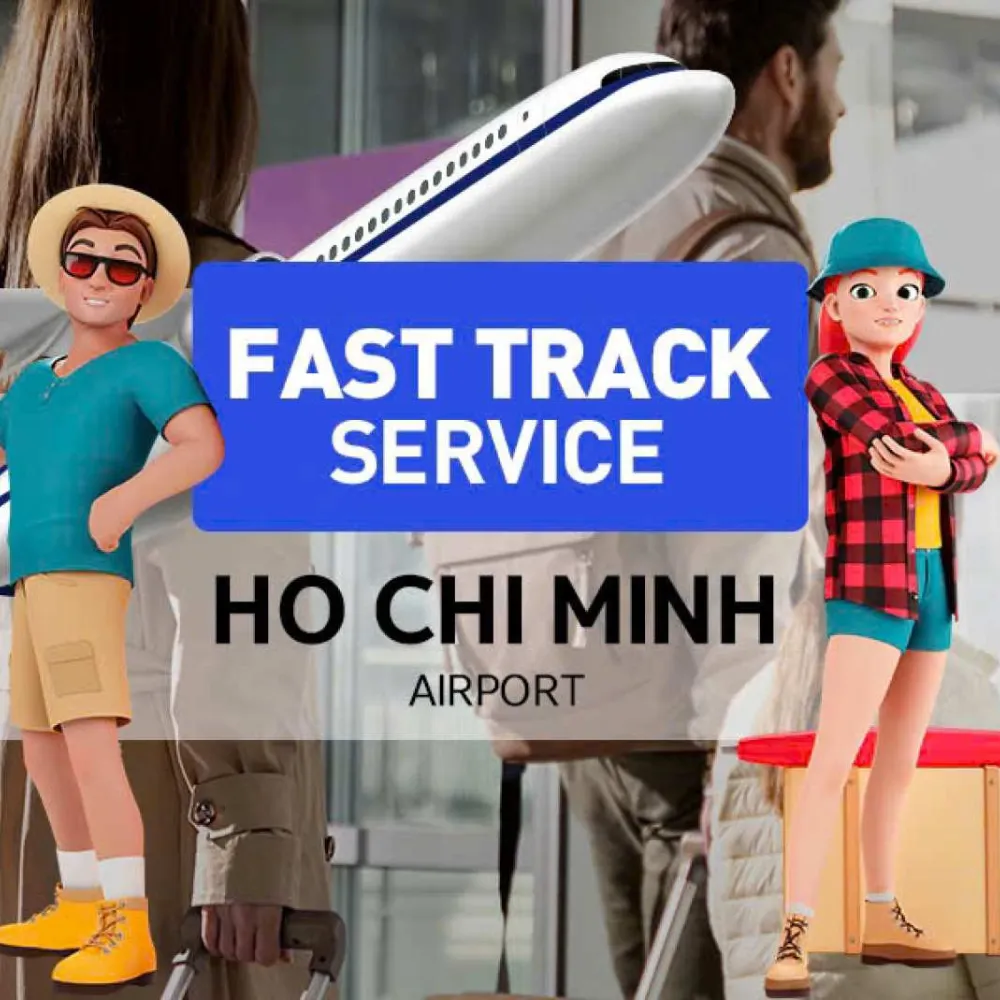Ultimate Guide to Vietnam Tourism for Indian Travelers
Vietnam, a captivating destination in Southeast Asia, is rapidly gaining popularity among Indian travelers, making Vietnam tourism for Indian an emerging trend. From its stunning landscapes and rich history to its delightful cuisine, Vietnam offers a diverse range of experiences for every type of traveler. As Indian tourists increasingly look towards this beautiful country for their next adventure, it’s essential to understand the various aspects of traveling in Vietnam, including visa requirements, top tourist destinations, cultural insights, and practical travel tips.
Table of Contents
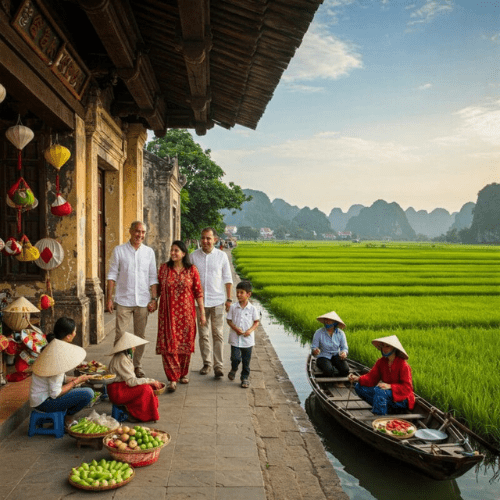
Introduction to Vietnam as a Tourist Destination
Vietnam’s allure lies in its unique blend of natural beauty, vibrant culture, and historical significance. Nestled between China to the north and Cambodia to the southwest, the country is known for its breathtaking landscapes, from lush rice terraces in Sapa to pristine beaches along the coastline. Moreover, the warmth and hospitality of the Vietnamese people make visitors feel at home, fostering a deeper connection with the local culture.
Overview of Vietnam’s Attractions and Culture
Vietnam is often celebrated for its rich tapestry of attractions, which include:
- Beautiful landscapes such as Ha Long Bay and the Mekong Delta
- Bustling urban centers like Ho Chi Minh City and Hanoi
- Historical sites, including ancient towns and war museums
The country’s culture is equally fascinating, shaped by a long history influenced by various civilizations, including Chinese, French, and indigenous traditions. Festivals, traditional music, dance, and art continue to play a significant role in daily life, providing visitors with numerous opportunities to immerse themselves in the local way of living.
Why Vietnam is Popular Among Indian Tourists
There are several reasons why Indian travelers are increasingly drawn to Vietnam.
- Affordability: Vietnam is known for its budget-friendly options when it comes to accommodation, food, and activities.
- Diverse Experiences: From trekking in Sapa to relaxing on the beaches of Da Nang, Vietnam caters to a wide array of interests.
- Cuisine: The delicious and varied Vietnamese cuisine is a major attraction, with many dishes appealing to Indian tastes.
As more Indians seek out international travel experiences, Vietnam emerges as a compelling choice that promises adventure, relaxation, and cultural enrichment.
Unique Experiences Offered by Vietnam
Travelers can engage in unique activities that showcase Vietnam’s essence, such as:
- Taking a cooking class to learn about traditional Vietnamese dishes
- Exploring the countryside on a bicycle or motorbike
- Participating in a lantern-making workshop in Hoi An
These experiences not only provide entertainment but also foster a genuine appreciation for Vietnam’s cultural heritage.
Visa Policies for Indian Tourists Visiting Vietnam
When planning a trip to Vietnam, understanding the visa policies is crucial for Indian travelers. Fortunately, the country has made significant strides in streamlining its visa application process.
Visa Requirements and Application Process
Indian passport holders are required to obtain a visa before entering Vietnam. The types of visas available include tourist visas, business visas, and e-visas. The most commonly sought-after is the Vietnam tourist visa for Indians, which allows for stays ranging from 30 days to 90 days, depending on the type chosen.
To apply for a visa, travelers need to provide essential documents, including:
- A valid passport with at least six months validity
- A completed visa application form
- Passport-sized photographs
- Proof of accommodation and travel itinerary
Applications can be submitted online or at the nearest Vietnamese embassy or consulate.
E-Visa and Visa on Arrival Options
India’s growing tourist traffic has led Vietnam to implement convenient options such as e-visas and visa on arrival.
- E-Visa: Indian travelers can apply for an e-visa through the official Vietnamese government website. This electronic visa permits entry into Vietnam for up to 30 days and is a straightforward process that can be completed in a matter of days.
- Visa on Arrival: This option is available for those who book a tour through a licensed travel agency. Upon arrival at the airport, travelers can obtain their visas with the necessary approval letter provided beforehand.
These options simplify the process for Indian travelers wishing to explore Vietnam conveniently.
Tips for Smooth Visa Processing
To ensure a smooth visa application process, consider these helpful tips:
- Double-check your passport’s validity to avoid any issues.
- Make sure you have all the required documents ready and correctly filled out.
- Apply well in advance of your intended travel dates to account for processing times.
- Keep copies of your visa documentation handy while traveling within Vietnam.
By following these suggestions, Indian travelers can minimize potential hiccups and enjoy a hassle-free experience in Vietnam.
Best Time to Visit Vietnam from India
Selecting the right time to visit Vietnam can greatly enhance your travel experience. The country boasts diverse climates across its regions, each offering unique attractions throughout the year.
Climate and Seasonal Considerations
Vietnam’s climate varies dramatically from north to south:
- Northern Vietnam (Hanoi, Sapa): Experiences four distinct seasons, with cool, dry winters (November-April) and hot, humid summers (May-October).
- Central Vietnam (Hue, Da Nang): Has a milder climate, with the best time for visits typically from February to August.
- Southern Vietnam (Ho Chi Minh City, Mekong Delta): Enjoys a tropical climate, with the dry season running from December to April and the rainy season from May to November.
Understanding these climatic variations helps travelers choose the best time to explore specific regions.
Festivals and Special Events in Vietnam
Vietnam hosts various festivals throughout the year that offer insight into the local culture and traditions. Some notable events include:
- Tet Festival (Lunar New Year): Celebrated in late January or early February, Tet is the most significant festival in Vietnam, marked by family gatherings, feasts, and vibrant celebrations.
- Mid-Autumn Festival: Typically held in September, this festival features colorful lanterns, mooncakes, and cultural performances, making it a lively time to visit.
- Vietnamese Independence Day: On September 2nd, the nation celebrates its independence with parades, fireworks, and festivities.
Attending these festivals provides visitors with a deeper connection to Vietnamese culture and traditions.
Ideal Months for Different Regions
To help plan your travels, here are the ideal months for visiting major regions in Vietnam:
- North (Hanoi, Sapa): March to May and September to November for pleasant weather.
- Central (Hue, Da Nang): February to August for warm and dry conditions.
- South (Ho Chi Minh City, Mekong Delta): December to April for dry and sunny weather.
Each region offers distinctive charm, so selecting the right months enhances the overall travel experience.
Top Tourist Destinations in Vietnam Tourism for Indian
Vietnam is dotted with incredible destinations that captivate the hearts of travelers. Here are some must-visit places that Indian tourists should consider while exploring the country.
Hanoi – The Capital City
Hanoi, the capital of Vietnam, seamlessly blends tradition with modernity. Known for its centuries-old architecture and rich culture, Hanoi is a city that offers various attractions.
- Historic Sites: Places like the Ho Chi Minh Mausoleum and the Temple of Literature provide glimpses into Vietnam’s history and heritage.
- Old Quarter: The bustling streets of the Old Quarter showcase the city’s vibrant street life, markets, and traditional crafts.
- Culinary Delights: Food enthusiasts will revel in sampling Hanoi’s famous dishes like Pho and Bun Cha at local eateries.
Hanoi serves as a perfect starting point for exploring other regions of Vietnam, offering a mix of culture, history, and gastronomy.
Ho Chi Minh City – The Vibrant Metropolis
Formerly known as Saigon, Ho Chi Minh City is Vietnam’s largest metropolis and a hub of economic activity. The city exudes energy, drawing in visitors with its fast-paced lifestyle and modern amenities.
- War History Museum: This museum provides deep insights into Vietnam’s tumultuous past.
- Ben Thanh Market: A must-visit for shopping and indulging in local cuisine.
- Sky Bars: Experience the city skyline from one of the many rooftop bars, where stunning views accompany refreshing cocktails.
Ho Chi Minh City is a dynamic destination that showcases Vietnam’s modern face while preserving its rich history.
Ha Long Bay – The Natural Wonder
Recognized as a UNESCO World Heritage Site, Ha Long Bay is renowned for its emerald waters and thousands of limestone islands topped with rainforests.
- Cruises: Opt for an overnight cruise to fully appreciate the bay’s natural beauty, visiting hidden caves and floating fishing villages.
- Activities: Kayaking, swimming, and hiking on Cat Ba Island allow travelers to experience the area’s pristine nature.
A trip to Ha Long Bay is a quintessential part of any visit to Vietnam, highlighting the country’s stunning natural landscapes.
Hoi An – The Ancient Town
Hoi An, a UNESCO World Heritage Site, is famous for its well-preserved Ancient Town, characterized by lantern-lit streets and traditional wooden houses.
- Cultural Heritage: Visitors can explore historical sites like the Japanese Covered Bridge and various temples reflecting the town’s multicultural influences.
- Tailoring: Hoi An is also known for its tailoring shops, allowing tourists to get custom-made clothing at reasonable prices.
- Beach Proximity: Nearby An Bang Beach provides relaxation after a day of cultural exploration.
Walking through Hoi An feels like stepping back in time, making it a charming destination for tourists seeking a slower pace.
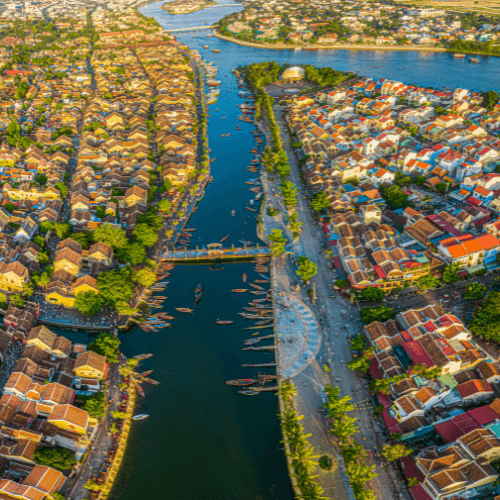
Sapa – The Mountainous Retreat
Nestled in the northern mountains, Sapa is known for its stunning terraced rice fields and rich ethnic diversity.
- Trekking: Adventure seekers can embark on treks to surrounding villages inhabited by various indigenous groups, such as the Hmong and Dao people.
- Scenic Views: The breathtaking landscape offers picturesque views of valleys and mountains, especially during sunrise and sunset.
- Cultural Interaction: Staying in homestays allows travelers to connect with locals and learn about their customs and traditions.
Sapa is a serene getaway for those looking to immerse themselves in nature and experience the vibrant cultures of Vietnam’s hill tribes.
Hue – The Imperial City
Once the imperial capital of Vietnam, Hue is steeped in history, featuring ancient architecture and royal relics.
- Imperial Citadel: A UNESCO World Heritage Site, this sprawling fortress complex gives insight into Vietnam’s royal history.
- Tombs of Emperors: Explore the elaborate tombs of Nguyen dynasty emperors, set against scenic backdrops.
- Perfume River: A boat ride along the river offers a peaceful escape while taking in the city’s beauty.
Hue is a historical treasure trove, making it a significant stop for culture enthusiasts.
Da Nang – Coastal Beauty
Da Nang, located on the coast, boasts stunning beaches and a thriving culinary scene.
- My Khe Beach: Renowned for its white sandy shores and clear waters, it’s perfect for relaxation and water sports.
- Marble Mountains: A cluster of five marble and limestone hills with caves, temples, and panoramic views.
- Culinary Scene: Da Nang is famous for its seafood and local specialties like Mi Quang (Quang noodles).
Da Nang combines beach leisure with cultural exploration, making it a popular destination among travelers.
Mekong Delta – The Riveric Landscape
The Mekong Delta is characterized by its intricate network of rivers, swamps, and islands. This region offers a unique experience of rural Vietnam.
- Boat Tours: Explore the local lifestyle by taking a boat tour through floating markets and small villages.
- Local Produce: Sample fresh fruits, honey, and traditional delicacies from local vendors along the waterways.
- Homestays: Staying with local families provides an authentic glimpse into their daily lives and customs.
The Mekong Delta is a serene and picturesque area where travelers can appreciate the natural beauty and vibrant communities of Vietnam.
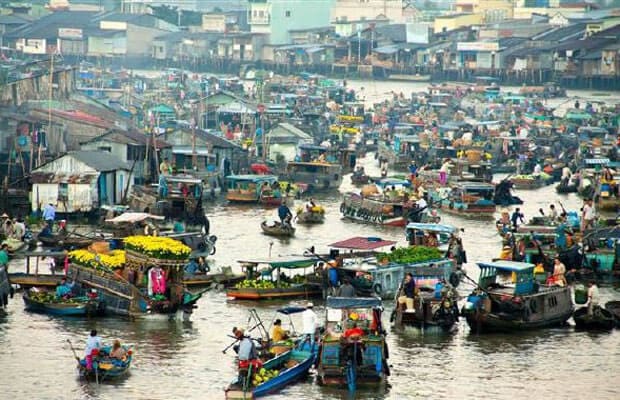
Cultural and Historical Insights in Vietnam Tourism for Indian
Vietnam’s rich culture and history are significant draws for travelers. Understanding the customs and the historical context enhances the overall experience.
Vietnamese Traditions and Customs
Vietnamese culture is deeply influenced by Confucianism, Buddhism, and ancestral worship. Key customs include:
- Family Orientation: Family is the cornerstone of Vietnamese society, and respect for elders is paramount.
- Tet Celebration: The Lunar New Year is the most important festival, symbolizing renewal and family reunions.
- Traditional Dress: The Ao Dai, a traditional dress for both men and women, reflects the elegance and grace of Vietnamese culture.
Engaging with these customs allows Indian travelers to appreciate the depth of Vietnamese society.
Major Historical Sites
Vietnam is filled with historical sites that tell the story of its struggle for independence and resilience.
- Cu Chi Tunnels: An extensive network of tunnels illustrates the ingenuity of the Vietnamese people during the Vietnam War.
- My Son Sanctuary: A UNESCO World Heritage Site showcasing ancient Hindu temples built by the Cham civilization.
- War Remnants Museum: Located in Ho Chi Minh City, this museum provides poignant insights into the impact of war on the country.
Visiting these sites enriches one’s understanding of Vietnam’s history and the challenges faced by its people.
Museums and Art Galleries
Vietnam boasts a vibrant arts scene, showcasing traditional and contemporary works.
- Fine Arts Museum (Hanoi): Housing an impressive collection of Vietnamese art, including paintings, sculptures, and crafts.
- Cham Museum (Da Nang): Dedicated to the Cham civilization, this museum displays exquisite Cham artifacts.
- Contemporary Art Spaces: Various galleries in Hanoi and Ho Chi Minh City highlight the work of modern Vietnamese artists.
Exploring these cultural venues provides insight into Vietnam’s artistic evolution and societal changes.
Cuisine and Food Experiences in Vietnam Tourism for Indian
Vietnamese cuisine is a gastronomic delight, combining fresh ingredients, bold flavors, and healthy cooking methods. For Indian travelers, familiar tastes meet exciting new flavors.
Popular Vietnamese Dishes for Indian Tourists
Vietnamese food is both diverse and flavorful, offering dishes that appeal to a wide range of palates.
- Pho: This iconic noodle soup is a must-try, with aromatic broth, herbs, and either beef or chicken.
- Banh Mi: A delicious fusion sandwich made with crusty bread, pickled vegetables, and various fillings.
- Gio Lua: Traditional Vietnamese pork sausage that pairs delightfully with rice or noodles.
These dishes reflect the harmony of flavors and textures that characterize Vietnamese cuisine.
Food Markets and Street Food Tours
Street food is an integral part of Vietnamese culture, providing an authentic culinary experience.
- Markets: Visit bustling food markets in cities like Hanoi and Ho Chi Minh City to sample local delicacies.
- Food Tours: Joining a guided street food tour offers a chance to taste various dishes while learning about their origins from knowledgeable locals.
- Night Markets: Explore vibrant night markets where food stalls come alive with tempting aromas and flavors.
Experiencing street food can be a highlight of any trip, revealing the true essence of Vietnam’s culinary landscape.
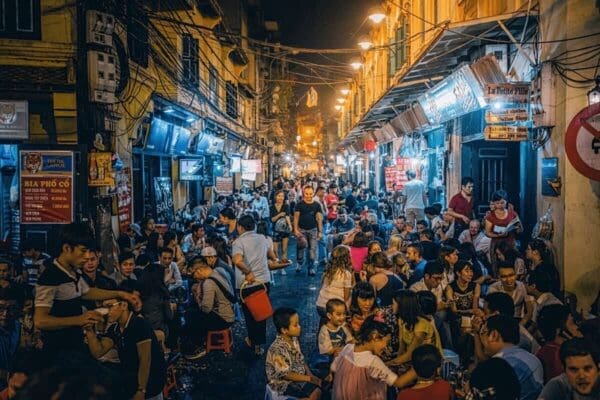
Culinary Classes and Cooking Experiences
For those interested in hands-on experiences, cooking classes are a great way to learn about Vietnamese cuisine.
- Cooking Classes: Participate in classes that start with market visits to choose fresh ingredients, followed by guided cooking sessions.
- Home Stays: Many homestays offer cooking workshops where guests can prepare and taste traditional dishes with local families.
- Culinary Workshops: Specialized workshops focus on unique dishes, offering insights into local culinary techniques.
These immersive experiences allow Indian tourists to take a piece of Vietnam’s culinary magic home with them.
Adventure and Eco-tourism Activities in Vietnam Tourism for Indian
For adventurous souls, Vietnam offers a plethora of outdoor activities and eco-tourism options amidst its stunning landscapes.
Trekking and Hiking Trails
Vietnam’s diverse terrain presents ample opportunities for trekking enthusiasts.
- Sapa Treks: Explore terraced rice paddies and remote villages inhabited by ethnic minorities, with guided treks suitable for various fitness levels.
- Fansipan Mountain: Known as “The Roof of Indochina,” reaching the summit of Fansipan is a rewarding challenge for avid hikers.
- Ba Be National Park: Offering picturesque trails along lakes and waterfalls, this park is a perfect getaway for nature lovers.
Trekking in Vietnam allows adventurers to witness breathtaking views while connecting with local communities.
Water Sports and Beach Activities
With its extensive coastline, Vietnam is a paradise for beachgoers and water sports enthusiasts.
- Surfing and Kiteboarding: Beaches like Mui Ne are known for excellent wind and waves, attracting surfers and kiteboarders alike.
- Snorkeling and Diving: Explore the underwater world around Nha Trang and the Con Dao Islands, teeming with marine life.
- Island Hopping: Take boat tours to nearby islands, enjoying sunbathing, swimming, and picnicking.
Whether seeking adrenaline-pumping activities or leisurely beach days, Vietnam caters to all preferences.
Wildlife Sanctuaries and Eco Parks
Vietnam is home to diverse ecosystems and wildlife, making it an excellent destination for eco-tourism.
- Phu Quoc National Park: This protected area features pristine jungles and rare species, offering opportunities for bird watching and nature trails.
- Cat Tien National Park: Known for its biodiversity, this park supports various wildlife conservation efforts and provides guided tours.
- Endangered Primate Rescue Center: Located in Cuc Phuong National Park, this center rehabilitates endangered primate species, giving visitors a chance to learn about conservation.
Exploring these eco-parks enables tourists to appreciate Vietnam’s natural beauty while supporting environmental initiatives.
Shopping and Souvenirs in Vietnam Tourism for Indian
Shopping in Vietnam is an exhilarating experience, with a variety of products reflecting the country’s culture and craftsmanship.
Local Markets and Bazaars in Vietnam Tourism for Indian
Markets are vibrant hubs of commerce and culture, offering unique shopping experiences.
- Ben Thanh Market (Ho Chi Minh City): A sensory delight filled with food stalls, textiles, handicrafts, and souvenirs.
- Dong Xuan Market (Hanoi): The largest indoor market in Hanoi features everything from clothing to local snacks.
- Night Markets: Many cities feature night markets where artisans display handmade items and unique gifts.
Visiting these markets provides insight into local life while discovering treasures to take home.
Handicrafts and Traditional Products
Vietnam is renowned for its high-quality handicrafts, perfect souvenirs for travelers.
- Silk Products: Vietnam produces exquisite silk items such as scarves, ties, and dresses that showcase traditional craftsmanship.
- Lacquerware: Colorful lacquered items reflect Vietnam’s artistry and can serve as beautiful decor pieces.
- Ceramics: Traditional pottery, particularly from Bat Trang village, is characterized by intricate designs and craftsmanship.
Purchasing these traditional products supports local artisans and preserves the cultural heritage.
Tips for Shopping Etiquette
While shopping in Vietnam, it’s essential to observe certain etiquettes:
- Bargaining: Haggling is common in markets; approach negotiations with a friendly attitude.
- Cash Payments: Many vendors prefer cash, so keep Vietnamese Dong handy for smaller purchases.
- Respect Local Practices: When visiting craft workshops or galleries, be respectful and mindful of the artisans’ workspaces.
By observing these practices, Indian travelers can navigate the shopping scene with ease and respect.
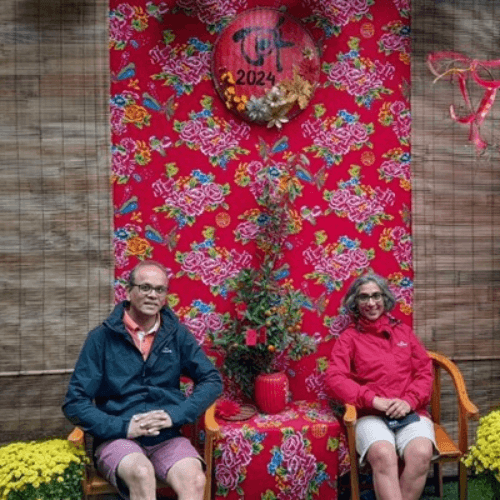
Accommodation Options for Indian Travelers
When visiting Vietnam, finding the right accommodation is vital for a comfortable stay. Fortunately, the country offers a wide range of options to suit different budgets and preferences.
Hotels and Resorts in Vietnam Tourism for Indian
Vietnam features a diverse selection of hotels and resorts catering to various tastes and budgets.
- Luxury Hotels: Cities like Ho Chi Minh and Hanoi boast luxury hotels with world-class amenities, perfect for those seeking premium service.
- Mid-range Options: Numerous boutique hotels provide a balance between comfort and affordability, often featuring charming decor and personalized service.
- Budget Stays: Hostels and guesthouses are abundant, offering affordable accommodations for backpackers and budget-conscious travelers.
Choosing the right hotel ensures a relaxing base for exploring the vibrant sights of Vietnam.
Homestays and Guesthouses
To immerse oneself in local culture, consider opting for homestays or guesthouses.
- Cultural Immersion: Staying with local families provides an authentic experience, allowing travelers to learn about daily life in Vietnam.
- Culinary Experiences: Many homestays offer home-cooked meals, giving guests a taste of traditional Vietnamese cuisine.
- Unique Settings: These accommodations often feature traditional architecture and stunning locations, enhancing the overall experience.
Homestays offer a unique opportunity to forge connections with locals while enjoying a personalized atmosphere.
Luxury vs Budget Stays
Vietnam caters to all kinds of travelers, whether you’re looking for opulence or simplicity.
- Luxury: High-end hotels in key cities offer luxurious amenities, fine dining, and spas for a pampered experience.
- Budget: Affordable options abound, providing comfortable lodging without sacrificing quality. Many budget accommodations also offer communal spaces to meet fellow travelers.
Finding the right balance between luxury and budget ensures a fulfilling travel experience tailored to your needs.
Transportation within Vietnam Tourism for Indian
Navigating Vietnam is relatively easy, thanks to its extensive transportation network. Understanding the various options available is crucial for smooth travel experiences.
Domestic Flights and Connectivity
With a growing number of domestic flights, air travel is often the quickest way to cover vast distances in Vietnam.
- Airlines: Several airlines operate domestic routes, offering competitive prices and efficient services.
- Major Airports: Key airports include Tan Son Nhat International Airport (Ho Chi Minh City), Noi Bai International Airport (Hanoi), and Da Nang International Airport.
- Booking Tips: Advance bookings can lead to better deals, especially during peak travel seasons.
Flying is a convenient option for Indian travelers looking to maximize their time exploring multiple regions.
Trains and Bus Services
For those who prefer overland travel, trains and buses offer a scenic way to journey through Vietnam.
- Train Travel: Scenic train routes connect major cities, allowing travelers to absorb the beautiful landscapes as they travel.
- Long-Distance Buses: Buses provide an affordable means of transportation, with sleeper buses available for longer journeys.
- Local Transport: Within cities, public buses and the Grab app (similar to Uber) facilitate easy movement.
Choosing trains or buses can enhance the travel experience, offering a chance to interact with locals and see the countryside.
Taxis, Ridesharing, and Car Rentals
In urban areas, taxis and rideshare services are readily available.
- Taxis: Metered taxis are widely used; however, it’s advisable to opt for reputable companies.
- Ridesharing Apps: Grab is the most popular ridesharing app in Vietnam, offering convenience and transparency in pricing.
- Car Rentals: For those who wish to explore independently, car rentals are an option, though be aware of local traffic rules.
Using reliable transportation options makes navigating Vietnam straightforward and enjoyable.
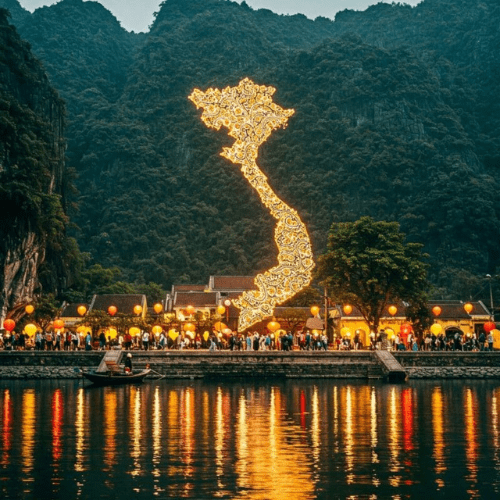
Travel Tips in Vietnam Tourism for Indian
Traveling abroad requires preparation, and being informed can significantly enhance your experience in Vietnam.
Language and Communication in Vietnam Tourism for Indian
While Vietnamese is the primary language, English is increasingly spoken, particularly in tourist areas.
- Basic Phrases: Learning a few basic Vietnamese phrases can go a long way in establishing rapport.
- Translation Apps: Utilizing translation apps can help bridge communication gaps in less touristy areas.
- Local Etiquette: Respect and courtesy are highly valued in Vietnamese culture, so approaching interactions with kindness is always appreciated.
By being mindful of language barriers, travelers can foster positive interactions and enrich their experience.
Currency Exchange and Payments
The local currency in Vietnam is the Vietnamese Dong (VND).
- Currency Exchange: Exchange currency at banks or authorized exchange centers for better rates than at hotels.
- Credit Cards: Widely accepted in urban areas, though carrying cash is essential for market transactions and remote areas.
- ATMs: ATMs are available in cities, but check withdrawal limits to avoid inconvenience.
Being aware of currency matters ensures hassle-free transactions while exploring Vietnam.
Safety and Health Precautions
Vietnam is generally a safe destination for travelers, but it’s wise to remain vigilant.
- Health Precautions: Ensure vaccinations are up-to-date and consider travel insurance for unforeseen situations.
- Personal Safety: Avoid displaying valuables and be cautious in crowded areas.
- Emergency Contacts: Familiarize yourself with local emergency numbers and the location of hospitals or clinics.
Taking these precautions helps ensure a secure and enjoyable travel experience in Vietnam.
Understanding Vietnamese Culture and Etiquette in Vietnam Tourism for Indian
Respecting local customs and etiquette goes a long way in ensuring positive interactions while visiting Vietnam.
Do’s and Don’ts for Tourists
Understanding cultural norms is essential for creating meaningful connections with locals.
- Do: Greet locals politely, show respect for traditions, and take off shoes before entering homes or temples.
- Don’t: Avoid discussing sensitive topics such as politics or the Vietnam War, and do not point feet at people or sacred objects.
Being culturally aware enhances the likelihood of warm interactions and fosters mutual respect.
Respecting Local Customs and Traditions
Vietnamese culture is rich in customs and traditions that deserve respect and consideration.
- Festivals: If visiting during festivals, participate if invited, as it shows appreciation for local culture.
- Dress Modestly: Particularly when visiting religious sites, dressing modestly demonstrates respect for local customs.
- Gift-Giving: When invited to someone’s home, bringing a small gift (such as fruit or sweets) is a kind gesture.
By embracing local traditions, travelers deepen their connection with the culture and create lasting memories.
Connecting with Indian Community in Vietnam ( Vietnam tourism for Indian )
As the Indian community grows in Vietnam, travelers may find opportunities to connect with fellow Indians.
Indian Restaurants and Grocery Stores
Many Indian restaurants cater to expatriates and visitors looking for familiar flavors.
- Popular Restaurants: Cities like Ho Chi Minh City and Hanoi host several Indian restaurants offering curries, naan, and biryanis.
- Grocery Stores: Indian grocery stores sell spices, snacks, and other products, allowing travelers to cook familiar dishes.
These establishments provide a comforting taste of home amid the adventure of travel.
Religious Centers and Cultural Events
Vietnam has seen the establishment of religious centers and cultural events that cater to the Indian community.
- Temples: Hindu temples can be found in major cities, providing a space for worship and community gatherings.
- Cultural Festivals: Indian festivals such as Diwali and Holi may be celebrated within the community, offering a chance for connection.
Participating in these events can enrich one’s travel experience and foster friendships with fellow travelers and locals alike.
Sustainable Vietnam tourism for Indian and Responsible Travel
As tourism continues to grow in Vietnam, promoting sustainable practices becomes essential for preserving its cultural and natural heritage.
Eco-friendly Practices
Travelers can contribute to sustainability efforts through responsible choices.
- Minimize Plastic Use: Carry reusable bags and water bottles to reduce waste.
- Support Local Businesses: Choose local accommodations, eateries, and guides to promote economic sustainability.
- Nature Conservation: Respect wildlife and natural habitats by following guidelines in national parks and reserves.
Practicing eco-friendly habits allows travelers to enjoy Vietnam while protecting its beauty for future generations.
Supporting Local Communities
Engaging with local communities fosters mutual respect and understanding.
- Community-Based Tourism: Participate in community tours that directly benefit local residents, helping preserve their traditions and livelihoods.
- Arts and Crafts: Purchase handmade goods, ensuring artisans receive fair compensation for their work.
- Volunteer Opportunities: Seek out volunteer programs that support education or environmental projects in local communities.
Connecting with locals through community engagement leads to enriching experiences for both travelers and residents.
Responsible Sightseeing Vietnam Tourism for Indian
When exploring Vietnam’s beautiful sites, practicing responsible tourism is essential.
- Leave No Trace: Follow guidelines to minimize environmental impact during hikes and visits to natural areas.
- Cultural Sensitivity: Understand and respect cultural customs and practices while visiting religious sites and traditional communities.
- Educate Yourself: Learn about the historical and cultural significance of sites visited, fostering a deeper appreciation for the local heritage.
Responsible sightseeing contributes to preserving Vietnam’s beauty and integrity, ensuring future travelers can enjoy its wonders.
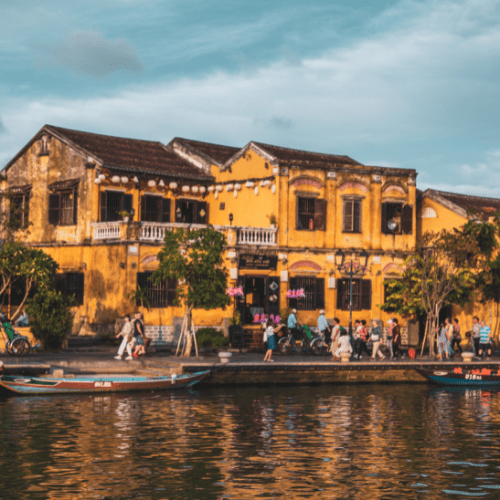
Conclusion Vietnam tourism for Indian
Vietnam stands as a captivating destination that combines stunning landscapes, rich culture, and delectable cuisine, making it an exceptional choice for Indian travelers. By understanding visa requirements, the best travel times, key destinations, and local customs, Indian tourists can embark on a memorable journey through this enchanting country. With a commitment to sustainable tourism and respect for local traditions, travelers can enjoy a unique experience while contributing positively to the communities they visit. As you plan your trip, let Vietnam’s charm and warm hospitality inspire you to explore its diverse offerings and create lasting memories.
Amidst countless options, you are probably looking for a travel company that truly understands Vietnam to turn your dream of exploring this S-shaped land into a reality. We, a local travel company in the heart of Vietnam, are proud to be natives of this land, carrying within us a love and deep understanding of every corner and every unique cultural aspect. Different from international travel companies, we don’t just offer tours; we share the most authentic and intimate experiences with Vietnamese life and people. You will discover famous destinations such as the majestic Ha Long Bay, the poetic ancient town of Hoi An, or the serene Imperial City of Hue from a local’s perspective
We understand that when setting foot in a foreign country, dedicated and timely support is extremely important. Therefore, our support team is always ready 24/7 throughout your journey in Vietnam, answering all your questions and assisting you in every situation. Moreover, with full licenses to organize domestic and international tours issued by the Vietnamese government, you can be completely assured of our prestige and service quality. Contact us today for the most professional and dedicated consultation, and let’s plan an unforgettable and complete trip to Vietnam together
At Vietnamtour.travel, we’re dedicated to making your journey seamless and memorable. We offer a comprehensive range of services, including Hotel booking, Car rental, Visa assistance, and Airport fast-track services, ensuring all your travel needs are covered.
Beyond the essentials, we specialize in a diverse array of tourism types tailored to your interests. Whether you’re looking for a Private, custom-designed tour, a relaxing Beach and island getaway, an enriching Cultural exploration, the vibrant energy of Urban tourism, or an authentic Agricultural and rural experience, we have something for everyone. We also expertly handle MICE tourism (Meetings, Incentives, Conferences, Exhibitions), providing professional solutions for corporate events.
Contact Us Now Vietnam tourism for Indian
WhatsApp 1 : +84 965 251 618
WhatsApp 2 : +84 989 248 646
Email: info@vietnamtour.travel
support@vietnamtour.travel
Website: www.vietnamtour.travel
• Hanoi Office: No. 3, Ngo 225 Luong The Vinh Street, Trung Van Ward, Nam Tu Liem District, Hanoi
• Ho Chi Minh City Office: Room 503, 5th Floor, C4 Building, Gia Khang Apartment Complex, 38 Street, Ward 14, Go Vap District, Ho Chi Minh City
Discover the Wonders of Vietnam Tours – Unforgettable Adventures Await
10-Day South Vietnam Travel Itinerary
Tours Vietnam Ho Chi Minh to Hanoi 8-10 Days – A Journey Through Culture, Nature, and Cuisine
The Ultimate Guide to Choosing a Reputable Company for Private Tours to Vietnam
Private Tours to Vietnam: Top 10 Unique Destinations 2025
Why Choose a Private Tour in Vietnam? Top Benefits for Travelers
